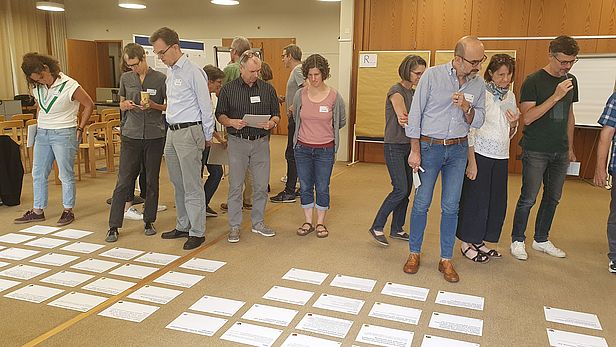The Swiss Federal Institute for Forest, Snow and Landscape Research WSL presents its 2035 research strategy. In times of climate change, biodiversity loss and urbanization, WSL has set itself the goal of being an important player in overcoming future challenges.
Dry summers and heavy rainfall, population pressure in urban, rural and natural areas, the introduction of non-native organisms and the resulting threat to native biodiversity, glacier melting and permafrost thawing: The world is changing. WSL is also responding to these changes with a new strategy.
«Over the next decade, WSL is committed to making a decisive contribution to finding solutions to the most pressing environmental and societal problems of our era,» says Christoph Hegg, Acting Director of WSL. «To achieve this goal, we have crafted the WSL Strategy 2035 through an inclusive and participatory process.»
Addressing the impact of global challenges ¶
The WSL Strategy 2035 aims to effectively meet the challenges of global change and is based on the institute's many years of experience and outstanding achievements.
The strategy focuses on four overarching development foci: global change impacts, sustainable urbanization, environmental governance and multifunctional landscapes.
Advancing core thematic areas ¶
The development foci build on the WSL's existing core thematic areas: forest, biodiversity, landscape, natural hazards, and snow and ice. «WSL boast significant expertise in these domains, with our scientists spearheading research for decades,» says Christoph Hegg. «Nevertheless, there are still many unresolved issues – and global change means that new questions are constantly being added.»
Apply the latest methods and approaches ¶
In all areas, WSL will continue to rely on state-of-the-art research and monitoring methods, and these are undergoing profound change due to rapid digitalization and technological innovations.
Furthermore, the Institute also considers partnership-based cooperation to be important, particularly in the development foci:
«The development foci address challenges that affect not only WSL, but environmental research as a whole,» emphasizes Christoph Hegg, «and they must be tackled holistically by the natural and social sciences together.» Key to this approach is cooperation with other research institutes, such as Eawag.
The WSL Strategy 2035 was developed in a nine-month process. Christoph Hegg affirms, «As a federal research institute and part of the ETH Domain, we are committed to excellence in research and implementation with Strategy 2035. WSL stands prepared to confront the challenges of a changing world».
The world in global change
Global change – climate change, land-use change, and other anthropogenic impacts – is the cause of most of today’s pressing environmental and societal challenges. Switzerland and Europe in general are being exposed to increasingly frequent climatic extremes, including warmer, seasonally drier conditions, but also heavy precipitation events. This region is also experiencing increasing population pressure in urban, rural, and natural areas. Intensive agriculture, urbanization, climate change, and introduced non-native organ- isms threaten native biodiversity. Furthermore, ice loss and permafrost thaw expose mountain regions to increasing risks.
Always up to date: Subscribe to the WSL Newsletter
Contact ¶
Download WSL Strategy 2035 ¶
-
WSL Strategy 2035 2 MB
Copyright ¶
WSL and SLF provide image and sound material free of charge for use in the context of press contributions in connection with this media release. The transfer of this material to image, sound and/or video databases and the sale of the material by third parties are not permitted.
